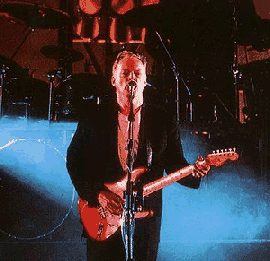Success came again into the Eighties with The
Wall.
The Wall allowed Waters to vent his spleen more than ever, pouring anger and
scorn on a succession of establishment talismen.
This epic about the Weltschmerz (world-weariness) of a rock star named Pink, stayed
over two years on the charts and inspired a movie by director Alan Parker, and a mammoth
tour with one of the most celebrated stage shows of all times.
The movie Pink Floyd - The Wall utilises the efforts of Bob Geldorf as Pink, Bob
Hoskins as Pink's manager, and the incredible artistic talent of Gerald Scarf who
brilliantly animated pans of the film.
One of the songs of the album was the anti-educational system diatribe
"Another Brick In The Wall", which not only restored the group to the British
singles' chart, but provided them with their sole number 1 hit. 
Waters revealed an increasingly vitriolic spirit in his conceptual themes as he
addressed the breakdown of individual dignity in the face of a perceived Orwellian
post-WWII social order. The followup album The Final Cut,
a stark, humourless set that is largely considered a Waters solo effort, would be
the impetus behind his acrimonious departure from Pink Floyd.
Dealing once again with his father’s death in WWII and the injustice of the
political systems, Roger intended this work to be a requiem for "the post
war dream".
In The Final Cut were included songs written for The Wall,
but rejected by the group. Mason's contributions were negligible, Gilmour showed little
interest - eventually asking that his production credit be removed - and Pink Floyd's
fragmentation was evident to all. One single, "Not Now John", did reach the UK
Top 30, but by the end of the year knives were drawn and an acrimonious parting ensued.
"The end came when we did The Final Cut, and Dave said he didn't think
the record was good enough, so I asked him if he had any songs. Well, he hadn't got
any." (Roger Waters, lyricist and chief architect of Dark Side Of The Moon,
Wish You Were Here and The Wall.)
Richard Wright, who had been fired after differences with Waters, rejoyned Floyd, and
the band continued under Gilmour's steady direction. But the following albums A
Momentary Lapse Of Reason and Delicate Sound Of Thunder showed that something
didn't work anymore. Without Roger Waters' lyrical input, the new Floyd were pretty
toothless.
In 1985-1986, the fugitive Waters pursued legal action but failed to stop David
Gilmour, Nick Mason and Richard Wright to record projects and tours under the Pink Floyd
banner. While his solo career languished, the new Floyd - augmented by sidemen and
elaborate visuals - raked in $30 million on the 1987 mammoth tour.

Waters put on the stage his own "The Wall"-show: in 1990 at Potzdamer Platz,
East Berlin, with many well-known artists supporting his staging. Despite international
television coverage, the show failed to reignite his fortunes.
In 1994, Floyd mark 3 finally hit their stride with a new studio album, The Division
Bell. It had a typical "good days" Pink Floyd sound and is regarded as one
of their finest achievements. "It sounds more like a genuine Pink Floyd album than
anything since Wish You Were Here", Gilmour later stated.
With Wright a full-time member again and Mason on sparkling form, the group embarked on
another lengthy tour, judiciously balancing old and new material. The band also showcased
their most spectacular lightshow to date during these performances. Critical praise was
effusive, confirming the group had survived the loss of a crucial member.
Pulse cashed in on the success of the tours and was a perfectly recorded live
album. The packaging featured a flashing LED, which was supposed to last (in flashing
mode) for 6 months.
In 1996 Pink Floyd was inducted into the Rock and Roll Hall Of Fame. And the show goes
on...
The Wall >>>>>>
Books about PINK FLOYD:
Complete Guide
to the Music of Pink Floyd
Pink Floyd
Encyclopedia
Pink Floyd:
In The Flesh |